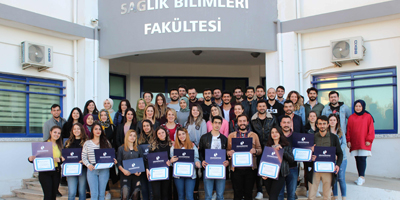“Workshop on Current Physiotherapy Practices in Neuromuscular Diseases” held at EUL

European University of Lefke (EUL) Faculty of Health Sciences Department of Physiotherapy and Rehabilitation organized “Workshop on Current Physiotherapy Practices in Neuromuscular Diseases”. Academician of Hacattepe University Faculty of Physiotherapy and Rehabilitation Prof. Dr. Ayşe Karaduman attended the workshop which was held at EUL Faculty of Health Sciences Department of Physiotherapy and Rehabilitation Treatment Movements Laboratory as a speaker.
The workshop was completed in two days with intensive work
In the workshop which was held with the intense participation of senior students, functional deficiencies caused by neuromuscular diseases from the point of view of physiotherapists, evaluation methods and physiotherapy rehabilitation strategies were discussed theoretically and practically. The workshop, which was carried out with examples from the child group neuromuscular diseases, was completed in two days with an intensive work.
Karaduman: Hereditary neuromuscular diseases affect both children and adults
Karaduman said that “Inherited neuromuscular diseases include a very large group of diseases, but they are considered to be rare diseases when their prevalence is evaluated individually (prevalence < 5/10.000)” and added that these diseases affect both children and adults. Pointing out that this group of diseases with genetic transition pattern has common clinical features, Karaduman said that “Neuromuscular diseases have a significant importance in our country, which has a relative marital marriage rate of 23% due to the genetic transition pattern of the disease”. Karaduman further noted that the disease progress with progressive and widespread muscle weakness, deformities in the legs and spine, respiratory problems and functional insufficiency with varying degrees.
Karaduman: Physiotherapy evaluation and approaches in neuromuscular diseases have great importance
Karaduman said that “No matter what type of neuromuscular disease, it may ultimately lead to various physical and functional failures” and added that medical and genetic developments in recent years and the emergence of new treatment hopes in neuromuscular diseases have brought this group of diseases to the agenda of the society. Karaduman also said that “The effect of new drugs is measured by how much children can regain their lost abilities” and added that just for this reason physiotherapy evaluation and approaches in neuromuscular diseases have great importance. Karaduman finally said that this group of diseases, which have not yet clarified the exact medical treatments, is very important in terms of general health protection, therapy and quality of life and emphasized the necessity of multidisciplinary approaches due to the multi-problematic structure of the diseases.
